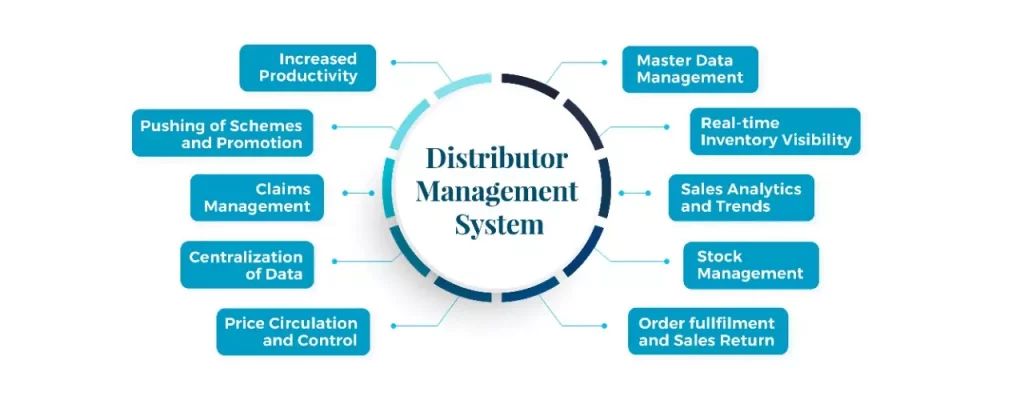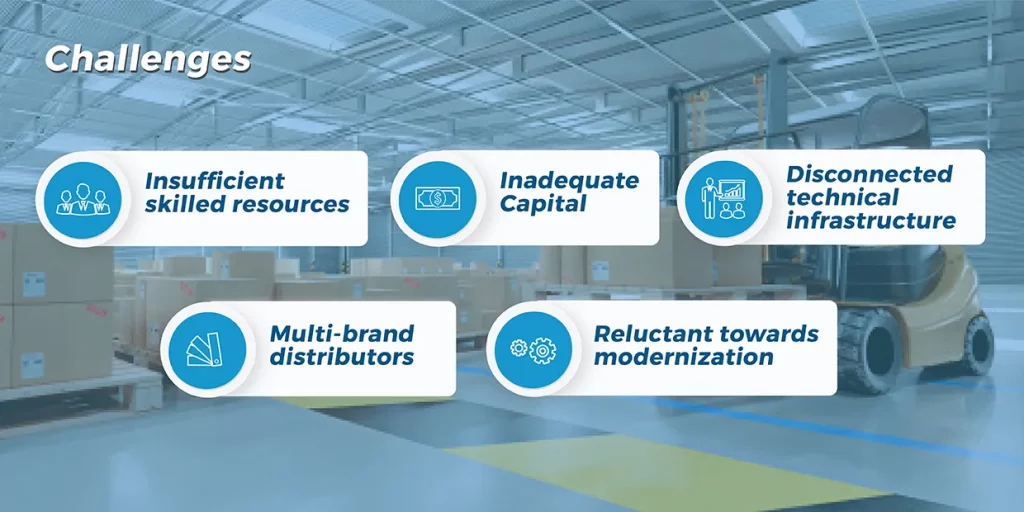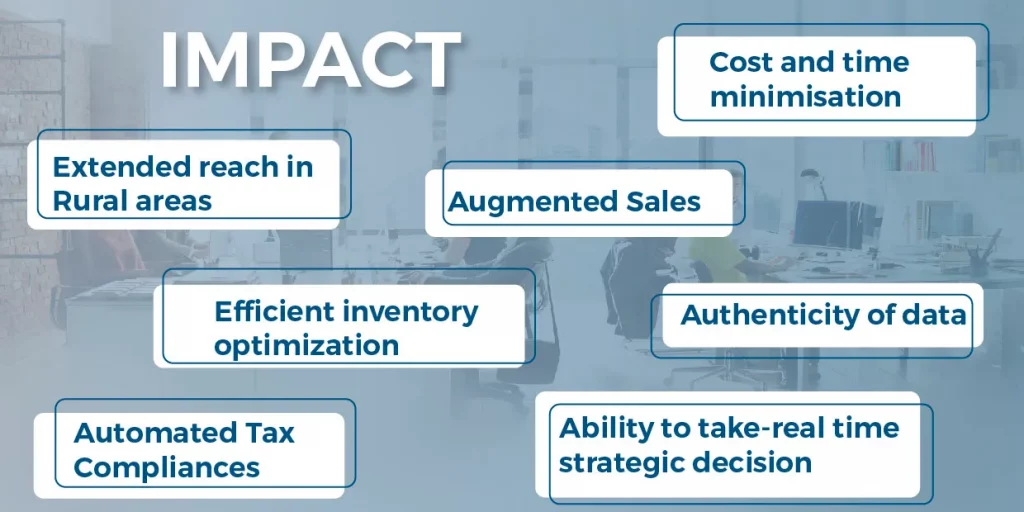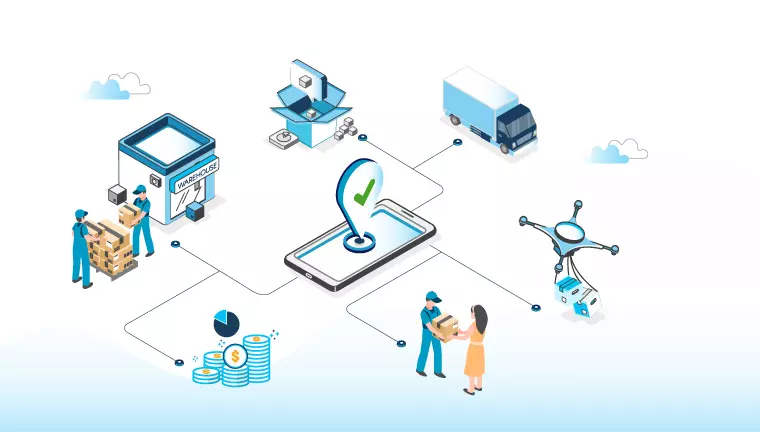Table of Contents
ToggleThe Distribution Management System supports in supervising the supply chain by managing promotions, invoicing, stock, distributor claims and many. As it really excites us to read that despite the setback in 2020, India is expected to be on track to emerge as one of the largest economies, translating into a GDP of $5.5 trillion by 2030, from about $3 trillion in 2021*. Naturally, a population of ~1.38 billion will create a huge, recurring demand for FMCG goods, to be fulfilled by companies from small scale, to MSMEs to large scale FMCG and CPG businesses leading to millions of transactions between brands, distributors, retailers, and customers every single day.
But with such evolving market dynamics, companies will need to consistently rise above the numerous challenges they face at the ground level to ensure the availability of their products on the right shelves at the right time. One way to do this is to have higher traction on the extensive network of distributors, super stockists, and mediators.
This army of channel partners needs to be fortified with the latest tools and technology much before any other stakeholders in the supply chain, as these partners still rely on manual inventory tracking tools, sales billing handbooks, and other obsolete systems.
Over the last few years, many home-grown and MNC brands have increasingly moved to a more robust and transparent Distribution Management system to overcome these challenges. But, before delving into the opportunities, let’s understand what a Distribution Management system is.
“A Distribution Management System streamlines all distribution workflows and activities, improves supply chain efficiency, eliminates stock-outs/overstocking, and allows companies to access real-time data from distributors.”

Distribution Management System is a gateway between the brands and retailers. A silver bullet that holds the power of managing end to end product delivery, right from capturing sales orders to invoicing to claims management. The concept of Distribution management system may sound very exciting for FMCG companies, but rolling it out across their partner network is fraught with challenges:
Challenges to adopting a Distribution Management system
As rightly said, India is a land of villages, and there are numerous challenges faced. The distribution channel is embedded down to the country’s remote places, and not only in the metros.

1. Insufficient skilled resources
Insufficient skilled resources can hinder the adoption of distributor consumer management systems. In a country like India, most skilled people opt to settle in urban areas. The rural areas face a scarcity of skilled workforce. As the Distribution channel is spread across remote places, it is highly challenging to employ people equipped with mastering and running the system software. Even when they acquire knowledge, it’s tough to shift their thought process and adopt new technology.2. Inadequate capital
Inadequate capital often deters distributors from embracing distribution management technology. Many times distributors face the challenges of inadequate capital. Issues like a sudden rise in the price or a decrease in demand in the market are common. In such conditions, many distributors repel the automated system’s application, as it requires investment. They are opinionated that their long-established maintenance method is better, unaware of the Distribution Management System benefits.3. Disconnected technical infrastructure
Disconnected technical infrastructure can further impede the implementation of distributor and consumer management systems. Many distributors are still of the idea that these automated systems are meant for corporates. With a lack of operational comprehension, unavailability of technical facilities, and the remote areas of working, these form significant barriers to allow distributors to automate their systems with technology and ease their work.4. Multi-brand distributors
Many distributors have to operate many brands as they have a conglomerate of brands under a single roof. Processing and managing other brands’ data under their various portals is challenging due to time and labor constraints.5. Reluctant towards modernization
Many distributors can be reluctant towards modernization and the adoption of distributor & consumer management systems. Most of the distributors follow the traditional approach to their business. They still practice the age-old format and rules followed by their forefathers as they believe that it is difficult to manage and operate automated new generation software. It is challenging to alter their opinions as they can sometimes be strong-headed.Impact of a Distribution Management System
A distributor management system streamlines the working of the supply channel. For brands and distributors alike, this means a lot of immediate benefits:
1. Authenticity of data
Distribution management practices have traditionally adhered to age-old formats and principles handed down through generations, often relying on basic computing for record-keeping. This approach is still hectic and error-prone. A Distribution management system is an automated tool that easily tracks the orders, claims, invoices, stock details etc. The data provided by the Distribution management system is accurate, validated and helps the distributors with future decision-making on what to stock, how many claims are still pending, how many orders haven’t been fulfilled etc. In the world of distributor and consumer management, accurate data is the bedrock on which success is built.2. Ability to take Real-Time Strategic decisions
The details provided by the Distribution Management System like multiple KPI Dashboards, Demand-Supply analysis help in quick decision-making and forecasting. In-stock statements, creditors’ limits, reorder of the stock can also be acquired via the DMS. This feature is pivotal for effective distributor consumer management and ensures that distributors can adapt to market dynamics with agility. FieldAssist’s DMS allows brands to take complete control of prices and schemes with agility to custom-manage different retail channels or classes. It also lets them maximize outlet penetration by implementing the right schemes to all channel partners with real-time fulfilment data. An ML-based Auto-Replenishment Module offers brands the smartest way to restock their Inventory and ensure zero stockouts.3. Augmented Sales
A DMS can boost sales as it will reduce the time required to carry on the operational processes to a great extent. With FieldAssist’s DMS’s, distributors can increase their sales using the analytics of the various information provided like KPI trends, Zone wise demand trends, etc. In the realm of distributor and consumer management, brands get a unified cycle of Demand Capture and Execution to ensure business continuity. They can capture demand 10 times faster, with real-time visibility of Price and Schemes. Agile and robust workflows for faster Claim Settlement help increase distributor liquidity and consequently, their inventory as well.4. Cost and Time minimization
A distribution system has different stages, like generating challans, order confirmation, invoicing, etc. Appointing staff for each stage can raise the cost of the working capital. To avoid the rising cost of capital and hassle-free working of the distribution, a distribution management system is required, which can acquire automated data, which, in turn, reduces the cost and time consumption at various stages.5. Efficient inventory optimization
Efficient inventory optimization is a cornerstone of modern distributor and consumer management. A good DMS provides access to data-driven insights, which empowers the distributors to manage their stock more efficiently with the least amount of investment. A full-service Distributor Management solution like FieldAssist’s DMS enables visibility on a distributor’s Inventory Management shows Batch-wise, real-time aging of stock to minimize returns, and improve profits. It also ensures sufficient stock at Distributors by directly integrating with secondary sales orders to achieve maximum fulfilment vs demand from retailers.6. Automated Tax Compliances
One of the most time-consuming tasks for any distributor is the calculation of taxes. A full-fledged DMS like FieldAssist’s DMS can take away that headache completely. It has pre-configured Tax Compliance protocols for generating correct Invoices. Distributors can easily manage returns by using the integrated e-invoicing and e-way option.
7. Extended reach in Rural Areas
A DMS is great for distribution partners who can afford to invest in a computer to run the app. This is because most DMS systems require an internet connection to sync individual app data with the master database, and offer real-time visibility to the brand. But what can companies do in rural areas and other remote locations where the only affordable gadget for distribution partners is a mobile phone?
That’s where FieldAssist’s Rural DMS shines. This unique solution helps brands get visibility on their long tail of distribution. Powered with key modules like Goods Receipt, Inventory Management, Van Booking, Billing & Purchase Order request, FA Rural Mobile DMS allows sub-stockists in rural areas to do the basic tasks well.
Know more about the product
In a vast country like India, a distribution management system can significantly ease the challenge of creating stronger partner relationships as well as increase transparency and ownership for both distributors and FMCG companies.
FieldAssist provides an easy and scalable distribution management system, which is equipped with master and price control, purchase and sales management, inventory management, analytical tools, and much more.
Looking for the Perfect DMS? Ask these 4 Simple Questions
To disrupt your own sales growth curve and streamline your primary sales workflows, get in touch with our DMS specialist today.
About Post Author
Nikhil Aggarwal
Driven by his passion for growth through automation, Nikhil takes pride in embarking his clients through a transformational journey and helps them be a more resilient, agile, and future-ready brand.




